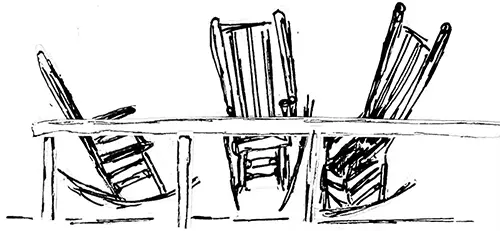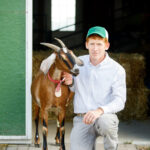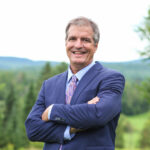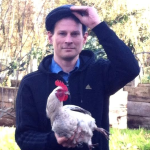The Feed Store 110
“The Place of Man Within the Whole”: A (Brief) Theology of Hunting
We’ve recently started the annual tradition (three years going strong!) of holding a wild game dinner with our friends and church community. Each family brings a dish harvested from the…
Fear and Hope in the Hay Field
We need to love smaller, more energy-efficient houses and cars in order to love people more. We need to give up much of our casual oil consumption for leisure. We…
Kayaking with Lambs
The newest book from FPR Books is Brian Miller's Kayaking with Lambs. Enjoy this excerpt, and then pick up a copy of the book. This life is not what was…
The Year We Went Inorganic
When my wife and I started our rural homestead, we were suburbanites with a lot of ideas. For one, we’d do everything organically. No question. Second, we’d endeavor to only…
Does Food Policy Matter? A Review of Small Farm Republic
Folks reading this site might, and there is a minority of the public that spends the time and money to grow produce or seek out good, local farms. But most…
What’s the Beef with Cows?
Cows do not kill people; people kill people. Especially people who claim cows are the problem. Cows are key players in solving the problems created by industrial agriculture.
There’s No More Room: Toward an Anarcho-Pastoralism
What I’ve just attempted to describe are the joys of the edge. Freedom, I believe, has a limited half-life when it’s in the heart of civilization. Anarcho-pastoralism means that there’s…
A Beautiful Farm?
These benefits and this healing can only begin to happen when beauty is allowed once again on the farm. One cannot truly have a good farm without it.
Silage and the Silence of the Corncrake
I’ve been talking to elderly friends here in the Irish countryside about what they used to do when the sun shone. The answer, of course, was that they made hay.
That Dog Won’t Hunt!
Whether hunting or watching TV at home, you will never be alone with a good dog by your side. Dixie and I may never get another bird, but a bird…
The County Meeting
We will speak to gatherings of farmers in seventeen different counties throughout southern Georgia. Along the way we will travel 1750 miles.
Live Trees and Dead Wood in the Tropics
A tended garden inevitably involves some choices, as well as planning which tree species will fruit better with more sunshine.
Heating with Wood as a Habit of Mind
I enjoy certain utilitarian advantages by heating with wood, but I also prefer the habits of mind—attention, connection, succession, frugality—that my woodpile’s growth and contraction inspires.
The Coming Cow Wars: Why Raising Cows is a Revolutionary Act
To nurture small-scale local agriculture is to oppose the Maoist, Stalinesque, Hitlerian, Huxlian, Schwabian, Gatesian push to monopolize global food production. My cows plod the Underground. And I plod along…
Not Vanity
I worked alongside Dad many times. I have also worked alongside other men and women with a disposition towards work like my father’s. They do their labor with skill, creativity,…
Getting to Know the Neighbors
We can increase the aesthetic appeal of our neighborhood by smashing the suburban quasi-monocultures of landscaping plants purchased from big box stores and restoring the rightful biodiversity of our ecosystems...Behind…
Is it Time Yet?
I’d always wondered what woodland flowers had to do with morels and fishing. I’d also marveled about how robins knew when to return north or questioned why certain mayfly imitations…
Is Joel Salatin the Problem? Reflecting on The Last Pig
My infrequent episodes of bringing death to animals have always taken an emotional toll on me. Making a weekly trip to the slaughterhouse for over a decade, as Comis did,…
New Leaf
If only I had the patience of trees; if only I let time inch me, push me, stretch me ever upward, defying gravity’s pull. My demand for instant responses mocks…
The Call of Farm Life: The Challenge of Constancy and Fidelity
While in my current brief stint in D.C., I am often given a puzzled look when I tell someone that I am going back to the farm: “You’ve made it…
Farming as Poetical: Masanobu Fukuoka and Wendell Berry on Agriculture’s Poetical Form
Poetry is the creative ordering of words to bring forth the fruits of the human heart and intellect. The poet is called to lose himself, so to speak, in listening…
A Farmer Who Walks the Talk
Human stories, centered around human persons in pursuit of wisdom, are the roots from which communities grow. We can be sure, by the sweat on the brows of each person…
Hunting and the Body of Christ
As we come to the supper table to feast upon pheasant breast or the backstrap of a whitetail deer, we gain an inkling of that invitation to the true Table…
A Frenchman Discovers Silicon Valley Post-Animal Agriculture
In the book Steak Barbare, Gilles Luneau unravels the industry that depends on promoting a vegan diet and post-animal agriculture. His book sheds light not only on how labs grow…











